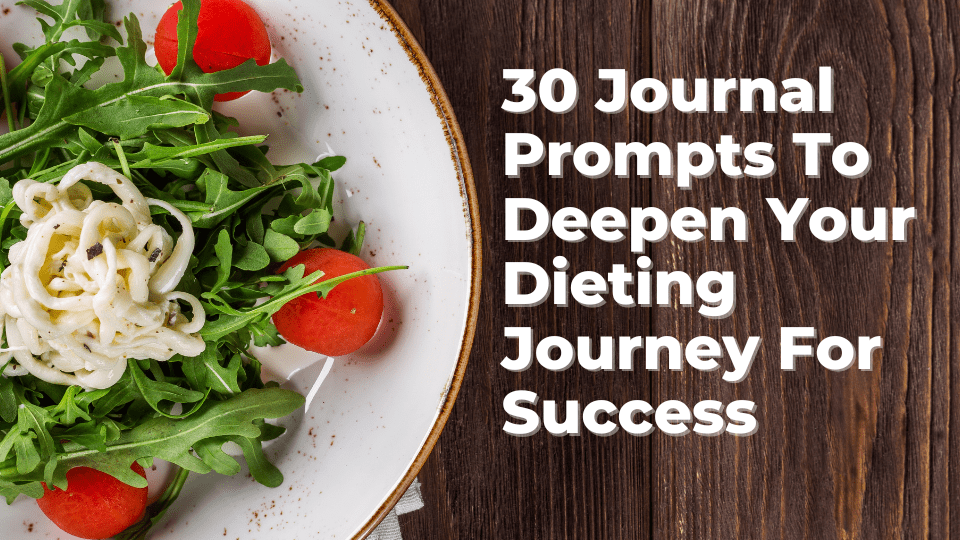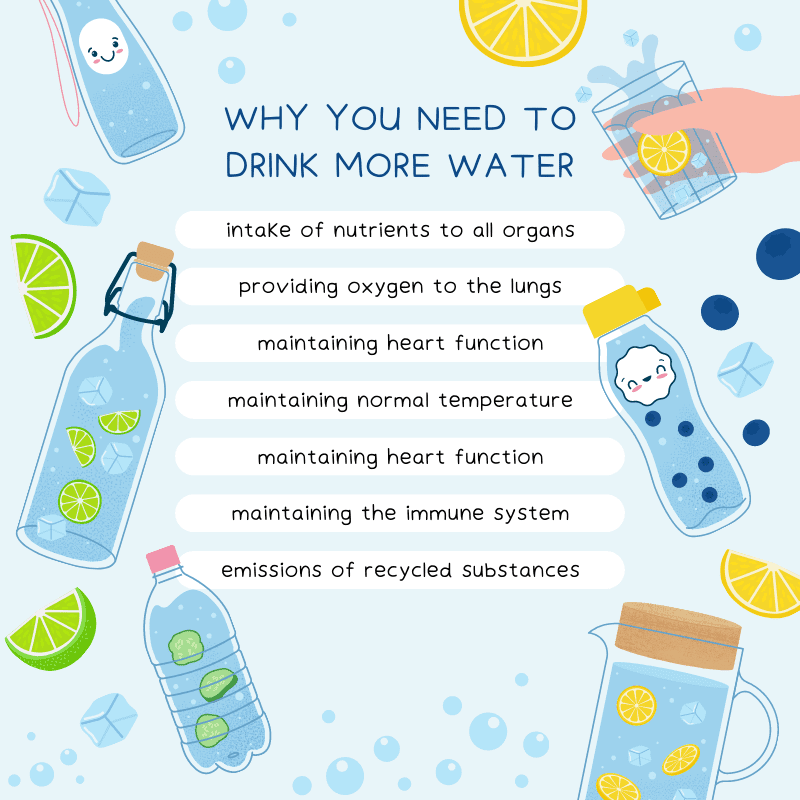Last Updated on February 21, 2024 by Jen
Embarking on a dieting journey can be a transformative but challenging adventure. It’s about more than just the foods you eat; it’s a mindful voyage into better understanding your relationship with nutrition. At least it should be if you want to be successful with it. That’s where the power of reflective journaling comes in – a personal compass that can guide you through the ups and downs of your dietary changes.
If you want to feel encouraged and motivated on your dieting journey, integrating 30 thought-provoking journal prompts into your routine can not only deepen your connection with food but also illuminate the path to your well-being.
The journal prompts provided below are categorized to address different facets of the dieting journey, ensuring that you can tackle both the practical and psychological challenges of changing how you eat.
The categories commence with understanding motivations, which delve into the reasons behind starting a diet, such as weight loss or improved health, and how to maintain that motivation throughout the process.
The next category, goal setting, explores the importance of setting realistic and achievable goals and tracking progress towards them.
Next, we have personal reflection, which delves into the importance of self-awareness and how it can aid in making sustainable changes to one’s diet.
The fourth category, navigating emotional triggers, discusses how to handle emotional eating and other triggers that may hinder progress towards dietary goals.
The strengthening commitment category focuses on finding ways to stay committed and motivated, even when faced with challenges or setbacks.
Lastly, the seeking balance category explores the idea of finding a balance between healthy eating and indulgence, as well as incorporating self-care practices into one’s daily routine.
By considering all of these journal prompts from the different categories, individuals can create a more well-rounded approach to their diet and overall lifestyle.
So, let’s get journaling!
Understanding Motivations
- What initially prompted me to consider dieting, and how have these reasons evolved? Reflecting on the evolution of your motivations can reveal the depth of your commitment and identify new or shifting priorities.
- In moments of temptation or challenge, which core motivations can I remind myself of to stay on track? Identifying solid motivations can serve as powerful mental anchors during tough times. Hint: Once you identify the core motivations that will keep you on track, write them down and put them in places you can see them to consistently motivate you.
- How do I differentiate between external pressures to diet and my intrinsic desires for dieting? For instance, is your friend influencing you to diet or is this something you truly want to do for yourself? Understanding this distinction ensures your efforts resonate with your true self, making your diet a personal and rewarding journey.
- Can I think of a moment in the past when motivation led to a tangible positive change in my health? Recognizing these instances can reinforce the importance of staying true to your motivations.
- What inspirational story or individual reminds me of why I started this diet, and how can I use this inspiration to fuel my progress? This inspiration can serve as a catalyst for continued effort and dedication.
Goal Setting
- What specific health benefits am I seeking from my diet? This helps in tailoring a plan that directly addresses your needs and measures progress in meaningful ways.
- How does setting measurable goals make me feel more in control of my dieting process? Acknowledging this control can empower you to make conscious choices every day.
- What smaller milestones can I set to make my overall goal feel more attainable? Breaking down your main goal into smaller, achievable targets can maintain your momentum.
- Is it important for me to have a flexible approach to my dieting goals? Reflecting on the need for adaptability ensures you can adjust your diet to fit evolving circumstances and insights.
- How will I celebrate achieving my dietary milestones, and why is recognition of my progress important? Celebrating small wins can boost your morale and reinforce positive behavior.
Personal Reflection
- How does my current relationship with food reflect my emotions, and why is this insight valuable? Understanding the emotional aspects of your eating habits can guide you toward healthier patterns.
- When have I turned to food for emotional comfort, and what healthier coping mechanisms can I develop? Identifying emotional triggers allows you to find alternative ways to address these feelings and be prepared when they come up.
- How does practicing self-care influence my dieting success, and in what ways can I increase self-care? Self-care is essential for maintaining balance and focus on your dieting journey.
- Can I recall a time when my emotions significantly impacted my diet, and how did I respond? Learning from past experiences helps in managing future emotional challenges effectively.
- How do I envision my emotional state improving as I progress towards my dietary goals? Visualizing emotional benefits can motivate you to persist in your efforts. For instance, visualize how good you will feel when you eliminate a food that causes you to feel sluggish.
Navigating Emotional Triggers
- How do stressful situations affect my dietary choices, and what strategies can I implement to manage stress without compromising my diet? Strategies may include meditation, exercise, or engaging in hobbies.
- In moments of boredom, how am I tempted to stray from my diet, and what activities can keep me occupied and aligned with my goals? Finding engaging alternatives can help overcome boredom-induced eating.
- What specific foods do I crave when seeking comfort, and what healthier alternatives can satisfy these cravings? Identifying these can help in making conscious choices that align with your dietary goals.
- How can I become more mindful of my eating triggers and develop strategies to deal with them before they lead to compromising my diet? Mindfulness can significantly enhance your ability to recognize and manage triggers.
- What role do my friends and family play in my dietary habits, especially regarding emotional eating, and how can I seek their support? A support system is crucial for enduring change. You may want to tell them about your commitment or ask them to avoid making certain foods when you get together.
Strengthening Commitment
- How can I reinforce my commitment to my diet, especially when faced with setbacks or challenges? Techniques might include journaling, seeking community support, or revisiting your motivations and goals.
- What daily affirmations can I use to strengthen my resolve and maintain focus on my dietary goals? Positive affirmations can recalibrate your mindset each day towards success. For instance, “I’m so grateful that I’m able to go on this dieting journey and see where it takes me.” (See more affirmations below.)
- How does documenting my dieting journey (e.g., through journaling or blogging) influence my commitment and provide accountability? Regular documentation encourages reflection and accountability.
- In what ways can I leverage setbacks as opportunities for learning and growth in my dieting process? Viewing setbacks as part of the learning curve fosters resilience and adaptability.
- How does visualizing my success impact my daily decisions and overall commitment to my diet? Visualization can be a powerful motivation tool, aligning your daily actions with your ultimate goals.
Seeking Balance
- How do I balance strict adherence to my diet with the occasional indulgence, and why is this balance important? Finding balance prevents feelings of deprivation and helps integrate the diet into a sustainable lifestyle.
- What mindfulness practices can I adopt to ensure I’m eating in a way that’s both healthy and satisfying? Mindfulness encourages a deeper connection with your food and its impact on your body. For instance, when presented with food, you may want to take the time to ask your body if this food is right for you.
- How can I ensure that my diet is not just about restriction but about nourishing my body and soul? Reframing your diet as a positive lifestyle change rather than a set of restrictions can foster a healthier relationship with food.
- What new hobbies or interests can I explore to complement my dieting efforts and enrich my lifestyle? Engaging in activities that align with your dietary goals can enhance your overall wellbeing. For instance, volunteering at a food bank can help you appreciate the foods you are free to buy and eat.
- How does integrating my dieting efforts with my broader life goals create a more holistic approach to health and happiness? Understanding how your diet fits into your larger life aspirations can motivate you to persist and succeed. How does your diet affect your relationships, career, or even fun and recreation.
15 Affirmations To Help You Stick to Your Diet
You can use the following affirmations as journal prompts as well, or you can just say them often for extra motivation.
- I am committed to my health and wellbeing, and my diet is an important aspect of that commitment.
- My body deserves nourishment and care, and I choose to provide it with healthy food choices.
- I trust in my ability to make mindful eating decisions that benefit both my body and mind.
- Every meal is an opportunity to fuel my body with the nutrients it needs.
- I am in control of what I choose to eat and how it affects my overall health and happiness.
- Feeling good about my food choices brings me joy and satisfaction.
- I am grateful for the abundance of nutritious options available to me every day.
- I am capable of making positive changes to my diet and sticking to them long-term.
- I choose to view food as a source of nourishment rather than comfort or reward.
- Being mindful of what I eat helps me stay in tune with my body’s needs and preferences.
- I am proud of the progress I have made in improving my diet and overall health.
- I am motivated to maintain a healthy and balanced diet, knowing it will contribute to my overall wellbeing.
- Every small step I take towards healthier eating habits brings me closer to my larger life goals.
- I am dedicated to taking care of myself physically, mentally, and emotionally through my diet.
- I am excited to see the positive impact of my improved eating habits on all aspects of my life, including relationships, career, and leisure activities.
These affirmations can serve as powerful reminders and mantras to help you stay committed to your diet and make mindful choices.
Remember that a healthy diet is not just about physical appearance, but also about overall well-being and happiness. By trusting in your ability to make informed decisions about what you eat, you are taking control of your health and setting yourself up for success.





